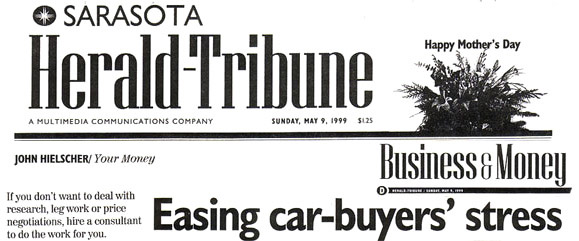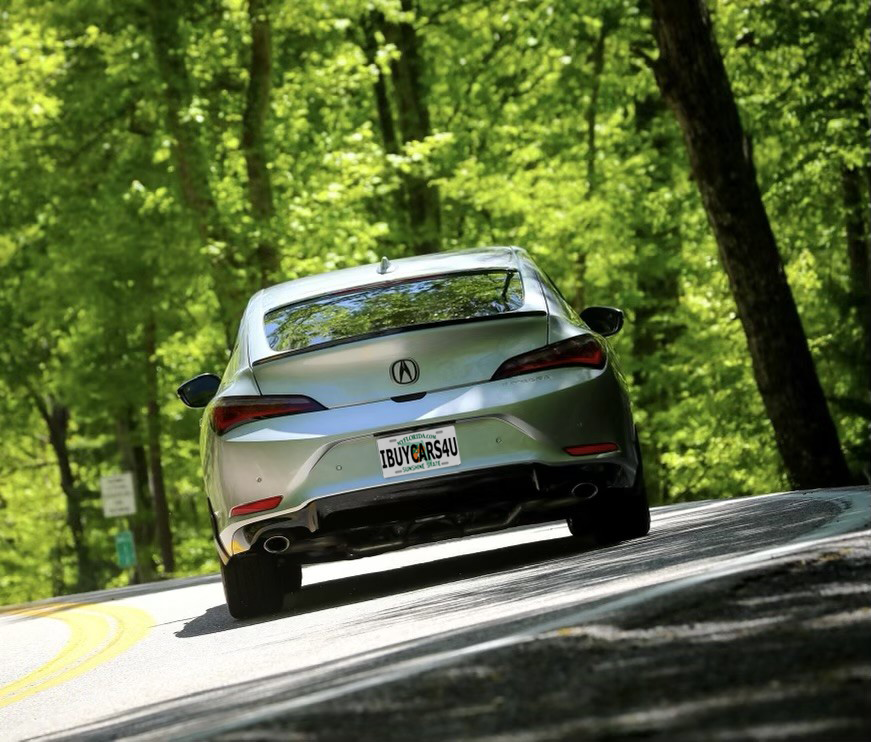
Stockbroker Vikki Ciotti needed a new car, but she dreaded the task of finding the right one and then haggling for the best deal.
“Most car salesmen, in my experience, haven’t got a clue what women look for in a car,” Ciotti said. “They either don’t ask or don’t listen.
“In my opinion, when women purchase a car, they have a conception that they’ve been screwed. They’re not sure by how much, but they know they’ve lost,” she said.
Enter Tony Langenderfer, an auto consultant in Sarasota.
For a fee, he did much of the shopping leg work for Ciotti, narrowed her choices to eight cars and spent a Saturday test driving them with her.
Ciotti, who’d given her 9-year-old Honda Accord to a family member, finally settled on a black Lexus GS300. Langenderfer then negotiated the purchase with the dealer.
“I always hated the negotiating part,” said Ciotti, a financial consultant with A.G. Edwards & Sons in Venice. “Tony saved me $3,500, which I like in my pocket better than theirs.”
Many consumers are intimidated by the complexity of today’s cars and the buyer-beware nature of the car-buying business. Surveys show that car buyers often quickly regret the deal they made – not necessarily over the car they acquired but over the feeling that they paid too much for it.
That’s opened the door for a variety of new ways for shoppers to find and buy cars.
Auto consultants like Langenderfer do the research on various models and then negotiate a purchase or lease for their clients.
In addition, there are car brokers, who buy cars from dealers at volume rates and deliver them to the consumer. Companies such as AAA have car-buying programs that offer pre-negotiated prices on new cars from dealers. Some dealers also tout fixed, no-haggle prices.
The Internet has become a key tool for car shoppers. Various Web sites offer free car-buying services, car-buying clubs, vehicle price guides and consumer advocacy information.
Langenderfer, who calls himself a “closet car salesman,” says he loves all the fact finding and the give-and-take over prices and terms. He’s owned nine cars in the past 12 years.
“I read about cars for relaxation,” he says, “I feel I know more about the car than the salesman.”
A former concrete salesman, he started his home-based Expert Auto Consultants Inc. as a part-time venture in early 1998 and went full time 10 months ago. The bulk of his business comes from referrals, word of mouth and network ing at Chamber of Commerce meetings and other business groups.
For a fee, he helps clients determine what models best fit their needs, compares prices and options among similar cars, finds a purchase or lease program, negotiates a price and assists on a trade in.
His laptop computer contains complete data and CD-ROM photos from manufacturers on every domestic and foreign make and model – in effect, he can show the car makers’ brochures on the computer screen. It lists wholesale pricing, breakdowns on sales invoices and retail pricing. He also can run cost comparisons on buying versus leasing and various terms.
He said he doesn’t push any particular model of car, but often finds that buyers aren’t aware of all their choices.
“Most people have a specific car in mind,” Langenderfer said. “One client who was sure he wanted either a Mitsubishi Diamante or a Mazda Millenia wound up with a Volkswagen Passat, a similar car he never would have considered, and he saved several thousand dollars.”
He said he keeps up to date on the incentives that are offered, not only to customers, but to dealers from manufacturers, information not usually known by shoppers. That’s extra profit promised to the dealer that Langenderfer says should be part of the negotiating process.
Some car companies also have dealer holdback, a percentage of the MSRP (manufacturers suggested retail price) that they pay the dealer each quarter. Langenderfer says that money should be on the table as well when coming to a final sales price.
After a customer selects a particular car, Langenderfer negotiates directly with the dealer’s sales manager. Most area car dealers are willing to work with him, though he said several won’t talk with him. He said that when he does the negotiating, the dealer’s profit will be less than when it deals straight with the buyer, but the dealer still makes a profitable transaction. (The salesman who handles the paperwork will make far less on his commission.)
“I’ve gotten the customer to the dealer, and I save the dealer time on the transaction,” he said. “The dealers are an integral part of my business, and I try to do things fairly, though some people don’t like it.”
Sarasota Ford, one of Southwest Florida’s largest car dealers, has had little interaction with auto consultants, said sales manager Cy Eveland. “We don’t have a problem working with them if that’s the way the customer wants to go,” Eveland said. “We’re a volume dealer, and we’re pretty price competitive any way.”
He said such consultants may be more active in other parts of the country, but he can’t recall dealing with any in the Sarasota-Manatee market.
“Our sales process is customer friendly enough that people don’t feel the need to have a middle man,” Eveland said.
Car shoppers need to consider more than just the price of the car and whether they can afford monthly payments, he said. Depreciation, a car’s resale value, how soon the buyer likes to change vehicles and whether they can pay in cash are among other important factors.
He advises many clients to consider the financial implications of leasing a car. Some 40 percent of new car “sales” are actually leases these days, and depending on the driver’s habits and preferences, leasing can be a moneysaving alternative.
For those who like to keep their cars for five years or longer, buying is probably the better way to go, he said. Most leases run for two- or three-year terms, the period of heaviest depreciation on the vehicle. A longer-term owner can save money over the life of the car, assuming it doesn’t incur major repair expenses. Ordinary maintenance costs typically rise sharply after 60,000 miles.
High-mileage drivers also may opt for buying over leasing. Leases generally allow 10,000 to 12,000 a year before a penalty of 15 cents a mile kicks in. A leaser who puts on 10,000 miles over the limit will owe $1,500 when turning in the car.
But for those who like driving a different car every few years, leasing could be attractive. It also offers flexibility – if you decide you don’t like the car as much as you thought, you can be rid of it in a few years.
It also conserves capital, Langenderfer said, since most leases require less money upfront over buying and in some cases, no upfront funds at all. Monthly payments are lower as well, since the leaser is only paying on a portion of the car’s value.
Langenderfer charges more for his used-car service than for new cars because it takes more time. Once the client knows in general the kind of car he wants and how much he can afford, Langenderfer said he hits all the used-car lots from Bradenton through Venice, often on Sundays when they’re closed, to find vehicles for the buyer to look at later.
John Hielscher can be reached by phone at 957-5194, by e-mail at sht-biz@aol corn, and by mail at 801 S. Tamiami Trail, Sarasota FL 34236.
